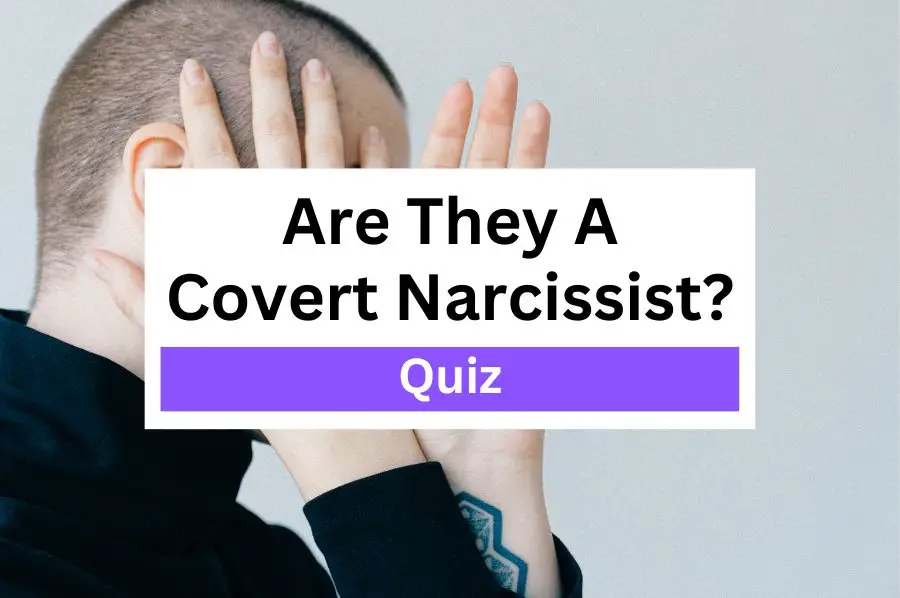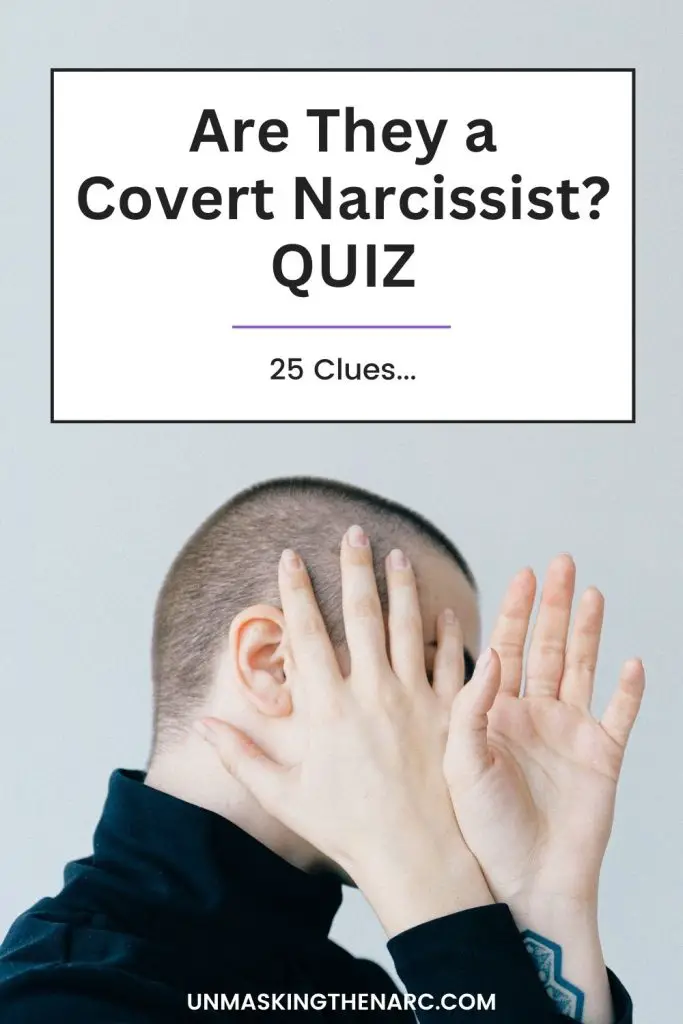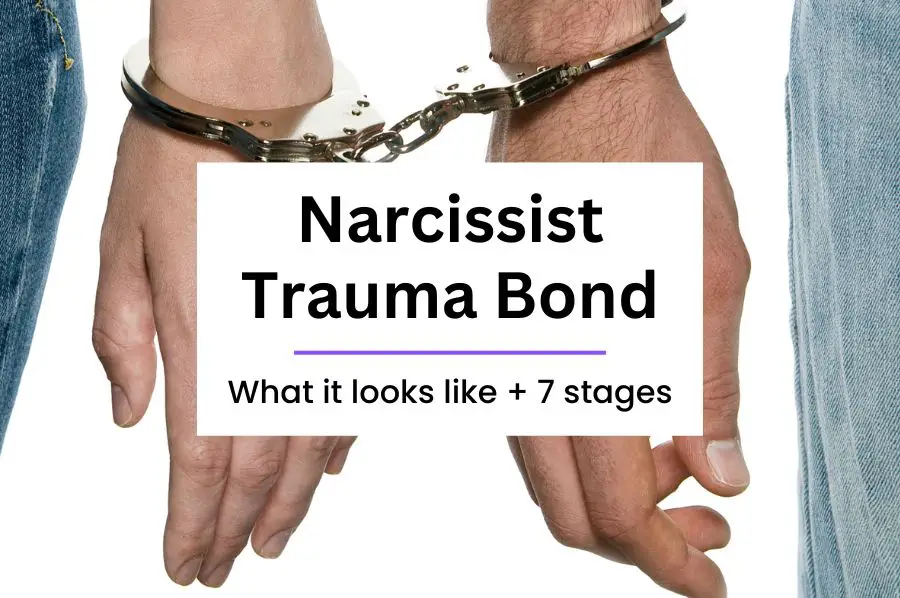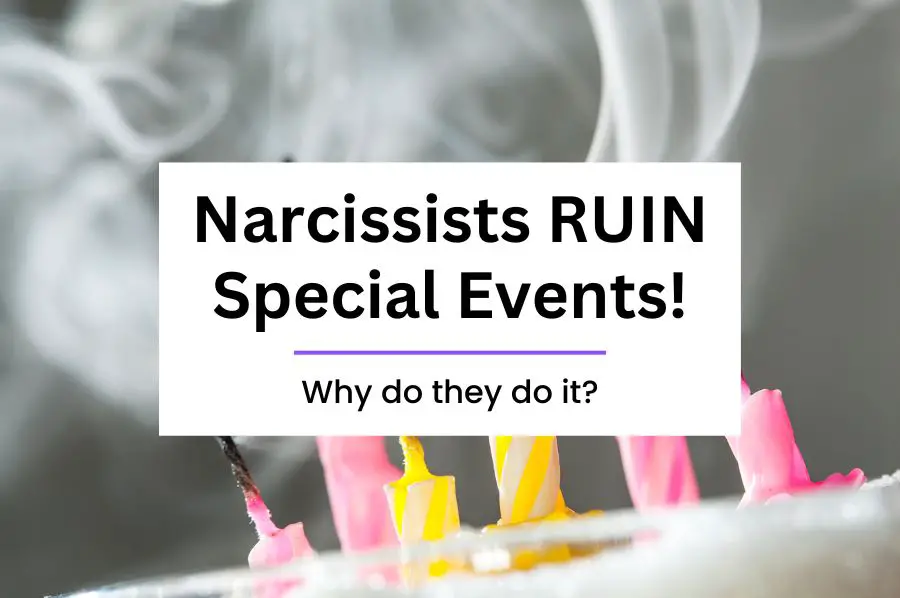Covert narcissists can slip into the crowd much more easily than grandiose narcissists. They can appear to be shy, introverted and even modest.
But don’t be fooled!
Covert narcissists will manipulate just as hard as any other narcissist. In fact, their covert ways make them all the more dangerous to kind and empathetic souls who will easily allow covert narcs to hook up to their life force energy and suck them dry without ever having realised what they were signing up for!
Take the covert narcissist quiz to find out exactly who you’re dealing with so that you can extract yourself, take your energy back and no longer feed their insatiable pity party.
| DISCLAIMER: This Covert Narcissist Quiz is to be used for personal awareness and educational purposes only. It is not a diagnosis. Please seek a professional therapist who has experience dealing with narcissism for further help and information. |
This post may contain affiliate links. For more information, see our disclosures here.
Are They a Covert Narcissist? Quiz
| Instructions |
|---|
| 1. Fill out the quiz 2. Press ‘NEXT’ 3. Scroll back up the page to the blue submit button 4. Press ‘SUBMIT’ 5. Your score will be calculated |
What Does Your Score Mean?
- 0 – 50 = It’s UNLIKELY that this person is a covert narcissist
- 51 – 69 = It’s POSSIBLE that this person is a covert narcissist
- 70 – 100 = It’s LIKELY that this person is a covert narcissist
▶️ VIDEO: Are They a Covert Narcissist? – Quiz

How Did They Become a Covert Narcissist?
When the pre-covert narcissist was a young child, they found themselves in an environment that was leaving them filled with deep shame and unworthiness. In fact, those feelings were so intense, they could not bear them any longer.
Unconsciously, the child chose to amputate the part of themselves that was making them feel that way. They cut off access to their True Self, without realising the damaging lifelong effects that would ensue.
Without their True Self, a gaping black hole was left in its place, which intensified the feelings of utter shame and self-loathing. You see, it’s our True Self that gives us access to the abundance of life force energy, which allows us to be our own source of love and security.
This created a split in the psyche where the narcissist was left with no choice but to allow their ego to take over as their new master.
Putting the ego in charge meant that they could create a new version of how they wanted the world to be – an entirely false reality. In this new fantasy world, all of the truth that they were running away from was inverted and the opposite made ‘real’ for them.

The covert narcissist was born, along with their delusional reality.
From this point forward, the ego would protect the narcissist from the truth of who they really are (a scared, insecure child who utterly despises themselves) at all costs. To achieve this, a False Self was created as a mask for them to portray to the world.
The role of the False Self is to present a ‘perfect and superior’ image to the world in order to gain attention and admiration from those around them. The attention from others is a surefire way to extract the life force energy they need to continuously feed their ego, which in turn keeps their fantasy reality alive for them.
The problem with this tactic is that their false reality is nothing more than a figment of their imagination. So, the ego needs constant feeding so that the delusion doesn’t drift off into nothingness, leaving them to slip down into the depths of their inner black hole.
Essentially, the covert narcissist is doomed to spend the rest of their days as a life-force drug addict.
It’s important to understand that the narcissist’s ego cannot accept any information that goes against their false reality of, “I am perfect, I am superior, I am a God.” Any evidence that comes towards them must be destroyed as a matter of psychological life and death.
However, covert narcissists deal with shame and low self-worth on a daily basis, which is why they need constant feedback from the world around them to give them ‘hits’ of self-worth. They need constant reassurance that they’re not those despicable feelings that sit inside. This is how they keep their fantasy delusion alive, which is a constant battle.
| READ: Energetics Behind Narcissism → |


Common Covert Narcissist Traits
After taking the covert narcissist quiz, you’ll have a better idea of whether or not that’s who you’re dealing with. Here are the common covert narcissist traits, which aid them in keeping their fantasy reality afloat.
Read on for the common traits of a covert narcissist.

Extremely Sensitive to Criticism
The covert narcissist’s ego is extremely fragile since low self-esteem is always just below the surface. Any hint of criticism against them (whether it’s real or imagined) will cause a narcissistic injury.
Their ego cannot accept this information as it goes against their false reality of being perfect and flawless.
So, if a covert narcissist is presented with criticism, they will project it straight back onto the person who brought it to them and then set out to destroy that person for daring to do so. This is the only way the ego knows how to avoid the attack of criticism from penetrating their false reality and taking down the whole thing.
Passive Aggression
Passive aggression is a way of indirectly expressing negative feelings instead of coming right out and addressing them directly.
Covert narcissists are quintessential passive aggressors. A big part of their False Self’s image is being ‘kind, gentle, helpful and likeable,’ even though they are not authentically any of these things.
Being passive-aggressive is a way to covertly manipulate and punish other people without being outwardly seen to be doing so.
Examples of passive-aggressiveness:
- Invalidating and belittling in the guise of ‘jokes’
- Withholding communication, affection and services as punishment (e.g. silent treatment or pretending that you don’t exist)
- Subtle blame-shifting
- Procrastinating to get out of tasks they feel they’re above
- Sabotaging others
- Holding grudges
| READ: 9 Tactics for Blame-shifting → |
Shy or Introverted
Covert narcissists lack the inflated confidence and charm that grandiose narcissists have. They appear much more shy, introverted and even humble, which is why they can be much harder to spot.
The only way covert narcissists can acquire self-esteem is by gaining validation from those around them. They don’t like to put themselves in positions where their inadequacies may be exposed, such as social situations or being centre stage.
They will even put themselves down in order to guilt the other person into giving them a compliment, which is another tactic for extracting validation and supply.
Fantasies of Grandiosity
Even though covert narcissists aren’t as outwardly arrogant and self-obsessed as the grandiose variety, that doesn’t mean they feel any less entitled to success, riches and anything else that would make them feel superior.
Covert narcissists can be very preoccupied with fantasies of being rich, holding positions of power at work, being famous and rubbing shoulders with elite social groups.
Due to the covert narcissist’s lack of self-worth or a willingness to work hard and put themselves out there, they rarely (if ever) achieve any of their grandiose fantasies. However, their inner fantasy of superiority and entitlement has them believing that those things should be handed to them simply because of “who they are.”
Depression & Anxiety
Depression and anxiety are very common among covert narcissists for a few reasons.
Firstly, they’re constantly having to escape the inner feelings of shame and self-loathing, which can only be found in gaining attention and validation from outside of themselves. But, for the covert narc, gaining their much-needed supply is much harder to obtain without actually having anything special to offer the world. So, they often resort to using fear, obligation and guilt tactics to extract supply from those around them.
Secondly, they’re constantly battling with their inner belief of being more special and superior to everyone else, but their outside world never seems to match up with that belief. In other words, they’re constantly seeing evidence (of an imperfect and ordinary life) that goes against their fantasy reality (of superiority and entitlement).
These constant internal battles often manifest as depression and anxiety.
Jealousy
Covert narcissists are notoriously jealous of the successes of others. They cannot stand seeing others have what they believe should rightfully be theirs.
Yet, their low self-esteem and aversion to having anyone see them as a failure hold them back from taking risks in careers and hobbies, which could potentially lead to success. Unless they are 100% confident they can do something perfectly and uphold their false version of themselves, they won’t even try.
So, they end up sitting back on the couch complaining about a world that is inherently unfair to them.
Selfish Altruism
You will see moments of empathy in a covert narcissist, but it will always be used in a self-serving manner.
If they do something nice for someone else, they need to be seen to be doing it and receive accolades for their ‘kindness.’
They’ll often be generous towards others because they expect something in return. This type of exchange is often unspoken, but you can feel the guilt attached to the gift or favour, even if you can’t see it.
If a covert narcissist does something for someone else and they don’t receive the validation, acclaim or trophy they were expecting, they’ll turn around and complain about how everyone is ungrateful and takes advantage of them.
Nothing a covert narcissist does is out of the goodness of their heart.
Play the Victim
The biggest telltale signs that you’re dealing with a covert narcissist are the pity parties. Covert narcs always have to be the biggest victims in the room.
As we’ve covered, covert narcissists do not have the good looks, talent or charm required for easily gaining attention and adoration from the world around them.
So, in order for them to get their much-needed drug of narcissistic supply, they use the ‘poor me’ method instead.
Covert narcissists regularly use Fear, Obligation and Guilt (FOG) to manipulate people into handing over their life force energy. They will even cry real tears if the situation requires it. This is how covert narcissists can easily slip under the radar as being narcs at all.
It’s easy to mistakenly think their tears and shy tendencies mean that they are truly “sorry” for hurting you and that they’re not self-obsessed. I get it, I was married to one for 20 years and he used these exact tactics to continuously rope me back in and hold me there.
If you’ve found that you are dealing with a vulnerable narc after taking the Covert Narcissist Quiz, it’s time to pull your energy back from them and focus on yourself.
Covert narcissists are experts at making others feel obliged to hand their life force energy over to them, but it’s important to realise that they are NOT your responsibility.
Your responsibility now is to heal and choose yourself.
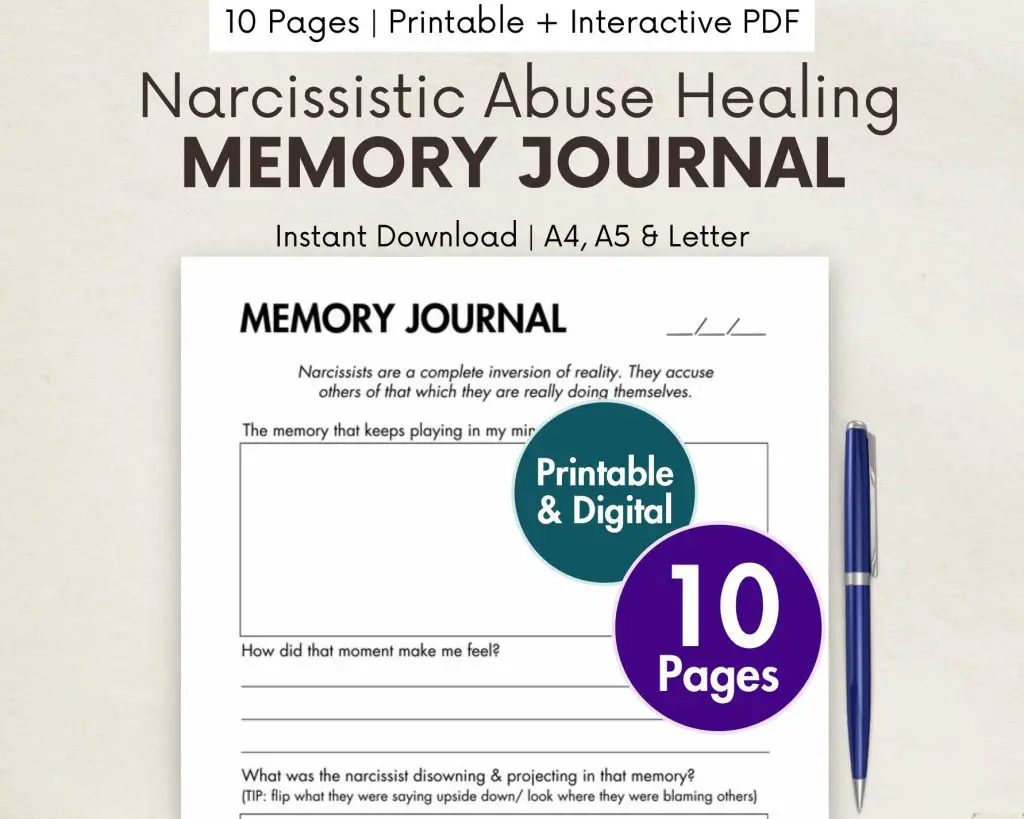
Memory Journal
Release the painful memories once and for all!
- Journal recurring thoughts
- Sort through what’s yours vs. theirs
- Identify your inner wounds to heal
- Return the narcissist’s disowned wounding
- Step-by-step guidance
- PRINTABLE & DIGITAL
Posts About Covert Narcissists
- 12 Female Covert Narcissist Traits
- 8 Common Covert Narcissist Traits
- QUIZ: Are They a Covert Narcissist?

